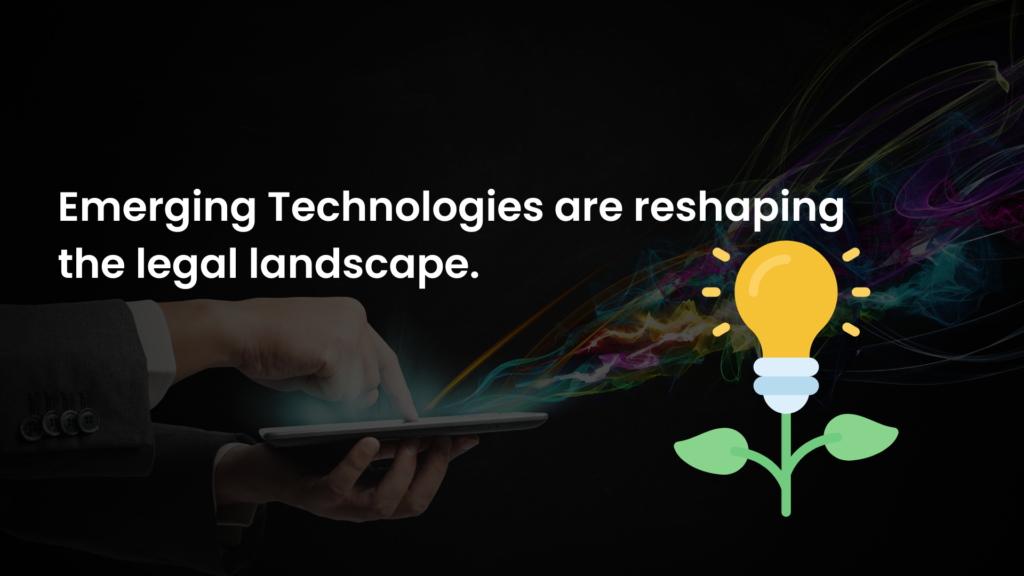Emerging technologies are indeed reshaping the legal landscape in numerous ways. By automating repetitive and time-consuming processes, emerging technologies have ushered in a revolution in sectors, particularly those requiring a significant degree of human participation. Chatbots and automated calls, for example, have greatly decreased the pressure on customer care teams in the customer service business. Nonetheless, the legal profession has long been accused of being slow to accept technology. Modern law firms, on the other hand, are attempting to reverse this perception by embracing technology in the law and capitalising on developing legal technology trends

What exactly is legal technology?
Traditionally, the use of technology in the legal field has been restricted to practise management, accounting and invoicing, administration, and document management. Yet, legal technology has advanced significantly in recent years, particularly since the epidemic forced everything online. Currently, automation options in this field include artificial intelligence (AI), blockchain, AI-powered legal assistants, and many more, all of which are assisting the justice system in providing more effective and efficient legal services.
Despite a bumpy start, technology for attorneys and law companies is currently revolutionising how lawyers and law firms may perform legal services. The year 2022 will be remembered as a watershed moment in the evolution of legal tech solutions, with a growth in the use of predictive analytics tools to minimise turnover time, the integration of AI technologies with legal outsourcing services, and improvements in business efficiency.
Emerging technological trends are bringing about important adjustments and influencing the current legal landscape in an industry recognised for its conventional working ways. Some of the ways that technology is changing the legal landscape include:
Digital revolution: Digital revolution is sweeping every business, and with clients shifting online, law firms and legal departments have little choice but to create and enhance their digital presence. Furthermore, digital interfaces are simplifying and expediting many legal procedures by providing stakeholders with simple access to a complicated system.
Automation: In the legal field, automation technology has eased monotonous and routine processes such as contract administration, legal research, eDiscovery, document review, data collecting, reporting, and communication. As a result, lawyers can now work more effectively and devote more resources to offering superior legal services.
E-Discovery: Electronic discovery, or e-discovery, is the process of collecting, reviewing, and producing electronically stored information (ESI) in response to a legal request or investigation. E-discovery software can now quickly search through vast amounts of data to find relevant information, making the process more efficient and cost-effective.
Blockchain: Blockchain technology is used to create secure, decentralised systems that can be used for digital transactions, record-keeping, and more. In the legal industry, blockchain technology can be used to securely store legal documents, track ownership of intellectual property, and even automate contract execution.
Artificial Intelligence (AI): AI-powered software can assist lawyers in tasks such as contract review, legal research, and due diligence. AI can also analyse large amounts of data to identify patterns and make predictions, which can be used in case strategy and settlement negotiations. AI and machine learning (ML) are profitable solutions that go beyond automation. As the volume of data in the legal profession grows, AI systems analyse massive volumes of data, detect trends, and do predictive modelling. Lawyers may find key evidence and develop successful litigation strategies using sophisticated data-driven insights.
Virtual Reality (VR): Virtual reality technology can be used in the courtroom to recreate crime scenes and accidents, which can help jurors better understand the evidence and make more informed decisions.AI and neural network model-powered chatbots use deep learning to operate as clients’ virtual legal assistants (VLAs). This increases reaction time while also freeing up resources for higher-value jobs. When the VLAs are unable to answer a question, they transmit it to the appropriate department, therefore increasing the team’s operating capacity.
Online Dispute Resolution (ODR): ODR platforms can be used to resolve disputes online, which can be faster and more cost-effective than traditional court proceedings. ODR platforms can also improve access to justice by making dispute resolution more accessible to people in remote areas or with disabilities.
Overall, emerging technologies are transforming modern legal practices and making it more efficient, cost-effective, and accessible, thus shaping the future of the legal industry. However, as with any new technology, there are also challenges and ethical considerations that must be addressed to ensure that these technologies are used responsibly and fairly.
Moreover, law and technology are no longer disconnected as technology for lawyers enhances the efficiency of legal services. Agility, after all, is essential for organisations on their digital transformation journeys, to be able to adapt to the dynamically changing business and technological landscape. The legal space, therefore, must also deliver and surpass organisational expectations using a keen digital mindset, supported by innovation. We are surely making strides on that path.